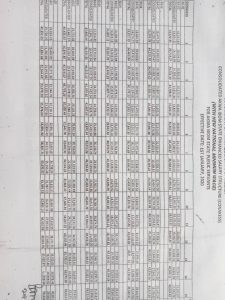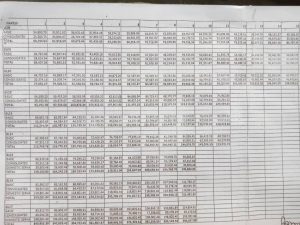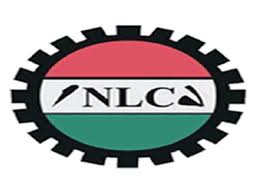By: Israel Umoh
For the first time, the Nigeria Labour Congress (NLC), Joint Public Service Negotiating Council (JPSNC) and Trade Union Congress (TUC) in Akwa Ibom have not spoken with one voice on some issues in the recent agreement signed between the state government and the organised labour for the implementation of the New National Minimum Wage for public servants in the state.
The NLC leadership led by Comrade Sunny James argued that N30,000 was not negotiable for Grade Levels 01-06 but that negotiation on Consequential Adjustments for workers on Grade Level 07-14 was the key issue and is inconclusive in the state.
However, Comrade Tina Essien, the state chairperson of Joint Public Service Negotiating Council (JPSNC) agreed that the state government has implemented the Consequential Adjustments for the workers on Grade Level 07-14 by placing them on the approved Federal Government percentages.
Even Trade Union Congress, TUC, in the state appears comfortable with the implementation of the agreement concerning the consequential adjustments because its members are not affected by the arrangement.
While James expressed unhappiness with the non-implementation of Consequential Adjustments for Grade Levels 07-14 and other workers’ demands, Essien was happy with the government over the implementation of the agreement.
NLC in the state controls 22 industrial unions while JPSNC is not a trade union but an administrative organ by the government for the ease of relating with trade unions operating in the public sector.
Recall that in the agreement reached between the government and the labour on January 23, Elder Effiong Essien, Head of Civil Service and Mrs Eme-ete F. Imuk, Permanent Secretary, Ministry of Finance signed for the Government while Comrade Tina Essien, chairperson of JPSNC and Comrade Akamba Awah, secretary of JSPNC penned for the union side.
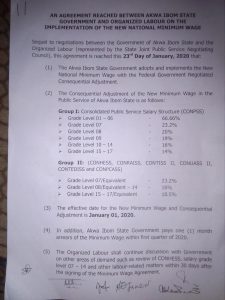
Comrade James of NLC and Comrade Dominic Abang, Chairman of Trade Union Congress, TUC, signed as witnesses.
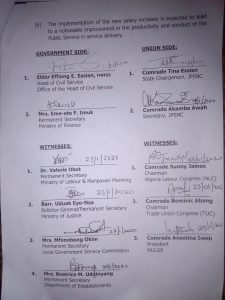
Speaking with the publisher of Straightnews at the Workers Solidarity Centre, Atan Offot in Uyo on Thursday, both NLC and JPSNC leaders bared their minds differently on the workers’ demands.
James said “I am not satisfied. Though I appreciate the Akwa Ibom government for finding time to close the negotiation. The negotiation had several stoppages especially the one of January 16 where it became necessary for the state NLC to step out of the negotiation to brief members of the State Executive Council. The reason was simple: The offer by the state government on the Federal Government’s percentages.”
According to him, “It might surprise the listening public that members of the JPSNC and TUC were satisfied with the state government’s offer. All I said and I am still saying is that the state government is not paying the New National Minimum Wage based on the Federal government percentages, but my stand is that what the state government wants to pay to workers on Grade Level 07-14 is lower than what is obtainable in other oil-producing states in the country.
“For members of TUC to have agreed with the state government is not a surprise because from Grade Level 15-17 who are predominantly members of TUC (Association os Senior Public Servants) are covered in the negotiation. They do not have any problem there. Workers on Grade Levels 01-06 do not have any problem. The remaining members of TUC are few in number- two while NLC has 22. Whenever NLC is not satisfied, we have every reason to say ‘no.’
“One may ask: why did you sign the agreement? I signed the agreement for peace to reign. Two, I signed it so that workers may begin to enjoy the new minimum wage. Three, I signed it because the fifth item on the agreement says that negotiation for Grade Level 07-14 will continue in the next 30 days,” he noted.
Speaking on the agreement, Essien described it “It was quite fine. It was a wonderful experience. It was interesting. We got what we were supposed to get for the workers because the headquarters of JPSNC directed on the percentages to be applied. The terms were on consequential adjustments, not salary review meaning that we should apply the percentages on the existing salary table. That is exactly what we were able to get for Akwa Ibom workers.
Asked if the percentages were made on the new minimum wage of N30,000 or on the consequential adjustments for Grade Level 07-14, she said “The point is that from the new minimum wage, 66.66 per cent was to be applied for Grade levels 01-06. Then from Grade Level 07-14, percentages would be applied too. The point is that at the last salary review, there was a lacuna (as we observed) for Salary Grade levels 07-14. For the new minimum wage, we have gotten what the national body directed us to do.”
Meanwhile, the state government has released salary table for the implementation of the New National Minimum Wage for all categories of public servants in the state. See the table below.
